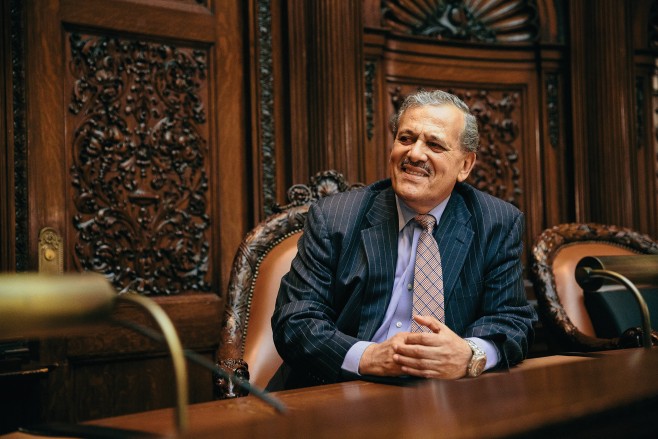
Luis A. Gonzalez ’68 earned his law degree at Columbia University and went on to rise through the judicial ranks of New York City. (Photo by Steven Stauffer)
In 1968, he became EMU’s first Puerto Rican graduate. In 2009, he became the first Puerto Rican to serve as presiding justice of the Appellate Division, First Judicial Department with jurisdiction over Manhattan and the Bronx.
In the intervening decades, Luis A. Gonzalez racked up a string of other firsts for a Puerto Rican migrant who grew up in Hell’s Kitchen: the first to sit on New York City’s Housing Court; the first to win a primary election to the Civil Court of the City of New York, Bronx County; the first appointed to the Appellate Term of the State Supreme Court; and the first administrative judge of any Supreme Court in New York State. (Supreme Courts are found in each of its counties, and, despite the name, are not the highest courts in the state.)
“You pray that God gives you the wisdom to do the right thing,” says Gonzalez.
Being a judge, he continues, carries “tremendous responsibility.” His decisions can affect people’s lives, liberty and fortunes in drastic ways.
As the presiding justice of New York’s Appellate Division, First Judicial Department, Gonzalez now supervises 19 other judges who hear appeals from New York City’s trial courts. They hear pretty much every sort of case – criminal, family, personal injury, employment disputes – but, Manhattan being Manhattan, much of their docket consists of “very, very, very complicated commercial litigation.”
Millions of dollars might be at stake in any given case. And because just a handful of cases go on to the state’s highest court, Gonzalez and his colleagues generally represent the end of the line and the final call.
For example: although Bernie Madoff was convicted in federal court for running the biggest Ponzi scheme in U.S. history, ensuing civil matters brought by bilked investors have come before the court where Gonzalez presides.
As Crossroads goes to press in the spring of 2015, the court is deciding a highly watched privacy case involving Facebook and the extent to which law enforcement can obtain personal information from user accounts.
“Every judge brings to the bench his or her set of values,” Gonzalez says. “I like to think the set of values that I bring to the court have been structured by my experience as a Christian and the foundation that was laid at Eastern Mennonite.”
Gonzalez’s path to Harrisonburg began when he met a Mennonite on an alternative service term in New York City. He got involved with a Mennonite church in the city, earned degrees from EMU in history and social science, and thought he was going to be a teacher. But, he says, the Lord moves in mysterious ways. Plans change.
By 1975, Gonzalez had a law degree from Columbia University, after which he spent about a decade working as an attorney in various capacities: for New York City, for New York State, in private practice, for the government of Puerto Rico. He first became a judge in 1985, appointed to the city’s housing court where he helped landlords and tenants sort out their quarrels.
Over the next 30 years came a succession of elections and appointments to higher courts. In June 2015, Gonzalez sat temporarily on the New York Court of Appeals – the highest court in the state – in place of a recused judge.
“That is an incredible honor bestowed upon me,” says Gonzalez. “Eastern Mennonite put me on a trajectory for a lot of firsts.”